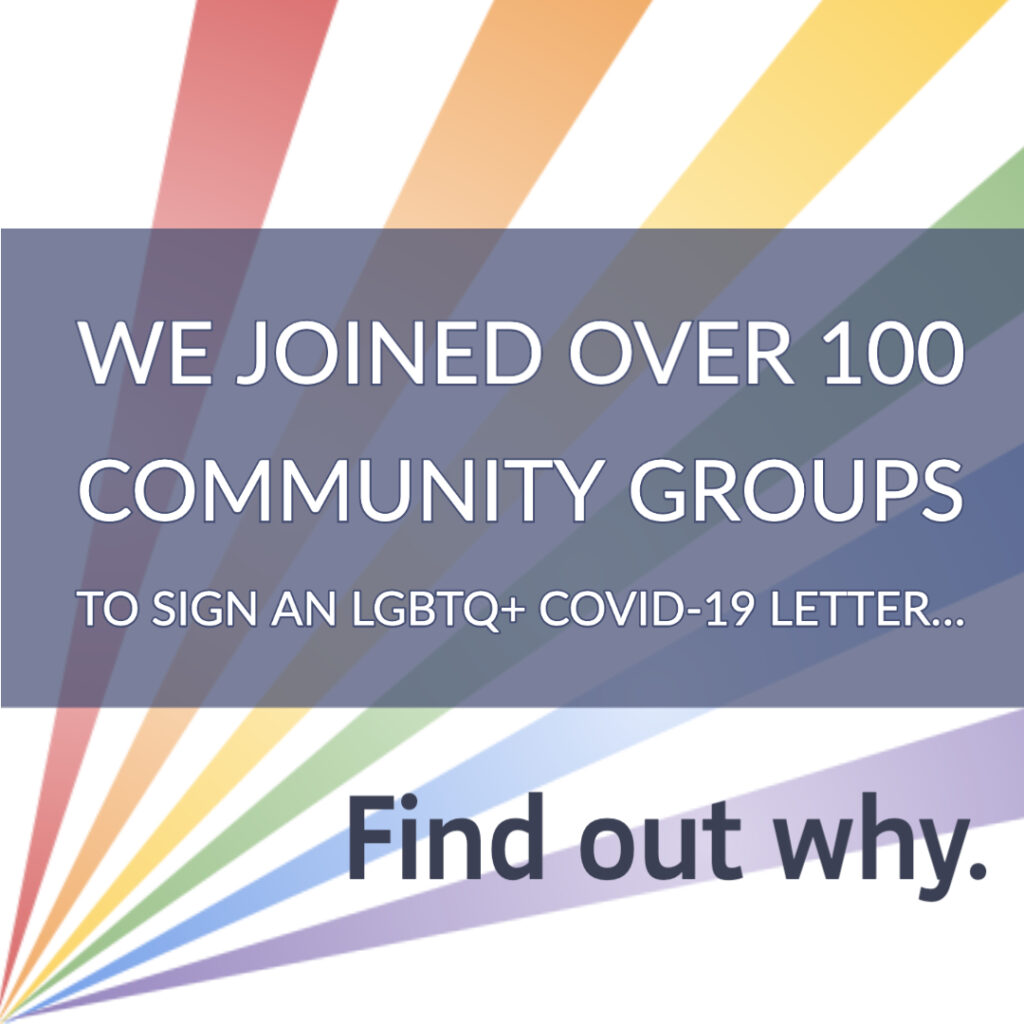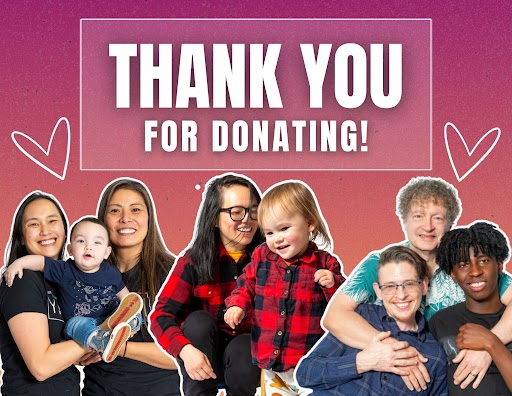Over 100 Organizations Sign On To Letter Outlining Added Risk
As the spread of the novel coronavirus a.k.a. COVID-19 increases, many LGBTQ+ people are understandably concerned about how this virus may affect us and our communities. The undersigned want to remind all parties handling COVID-19 surveillance, response, treatment, and media coverage that LGBTQ+ communities are among those who are particularly vulnerable to the negative health effects of this virus.
Our increased vulnerability is a direct result of three factors:
- The LGBTQ+ population uses tobacco at rates that are 50% higher than the general population. COVID-19 is a respiratory illness that has proven particularly harmful to smokers.
- The LGBTQ+ population has higher rates of HIV and cancer, which means a greater number of us may have compromised immune systems, leaving us more vulnerable to COVID-19 infections.
- LGBTQ+ people continue to experience discrimination, unwelcoming attitudes, and lack of understanding from providers and staff in many health care settings, and as a result, many are reluctant to seek medical care except in situations that feel urgent – and perhaps not even then.
In addition, there are more than 3 million LGBTQ+ older people living in the United States. LGBTQ+ elders are already less likely than their heterosexual and cisgender peers to reach out to health and aging providers, like senior centers, meal programs, and other programs designed to ensure their health and wellness, because they fear discrimination and harassment. The devastating impact of COVID-19 on older people – the current mortality rate is at 15% for this population – makes this a huge issue for the LGBTQ+ communities as well.
LGBTQ+ communities are very familiar with the phenomena of stigma and epidemics. We want to urge people involved with the COVID-19 response to ensure that LGBTQ+ communities are adequately served during this outbreak. Depending on your role, appropriately serving our communities could involve any of the following actions:
- Ensuring that media coverage notes the particular vulnerabilities of any person with pre-existing respiratory illnesses, compromised immune systems or who uses tobacco products. While populations – like LGBTQ+ communities – can be at increased risk, it is important to note the overall state of health that contributes to any person’s increased vulnerability to contracting COVID-19.
- Ensuring health messaging includes information tailored to communities at increased risk for COVID-19, including LGBTQ+ populations. An example of such tailored messaging is including imagery of LGBTQ+ persons in any graphic ads.
- Providing LGBTQ+ individuals resources to find welcoming providers, such as the ones provided here, if they are experiencing symptoms like a cough or fever and need to seek medical attention.
- Ensuring funding to community health centers is distributed in a fashion that accounts for the additional burden anticipated by LGBTQ-identified health centers. Whenever possible ensuring health agencies partner with community-based organizations to get messaging out through channels we trust.
- Ensuring surveillance efforts capture sexual orientation and gender identity as part of routine demographics.
- Ensuring health workers are directed to provide equal care to all regardless of their actual or perceived sexual orientation, gender identity/presentation, ability, age, national origin, immigration status, race, or ethnicity.
- Ensuring that all COVID-19 responses take into account exceptionally vulnerable members of the LGBTQ+ communities, including our elders, bi people, and black and brown trans and gender nonconforming/nonbinary people.
- Since xenophobic responses are heavily impacting the Asian American communities, ensuring all communications and responses related to COVID-19 attempt to counter any such xenophobic responses, avoid racial profiling, and discourage the public from doing so as well.
- Ensuring LGBTQ+ health leadership, along with all providers and health care centers, are provided with timely and accurate information to disseminate.
As LGBTQ+ community and health leadership, the undersigned organizations offer to stand shoulder to shoulder with the mainstream health leadership to make sure we learn from history and do not allow any population to be disproportionately impacted or further stigmatized by a virus.
Initial signers:
National LGBT Cancer Network
GLMA: Health Professionals Advancing LGBTQ Equality
Whitman-Walker Health
SAGE
New York Transgender Advocacy Group
National Queer Asian Pacific Islander Alliance
Additional Signers:
Advocates for Youth
Advocating Opportunity
Alder Health Services
Antioch University MFA Program
Athlete Ally
Atlanta Pride Committee
BiNet USA
Black Lives Matter Houston
Bradbury-Sullivan LGBT Community Center
California LGBTQ Health and Human Services Network
Callen-Lorde Community Health Center
CARES
Center on Halsted
CenterLink: The Community of LGBT Centers
Compass LGBTQ Community Center
Corktown Health Center
Counter Narrative Project
CreakyJoints & Global Healthy Living Foundation
CrescentCare
Darker Sister Center
Deaf Queer Resource Center
Desert AIDS Project
Desi Queer Diaspora
Equality California
Equality Federation
Equality North Carolina
Erie Gay News
Family Equality
Fenway Health
GALAEI
Gay City: Seattle’s LGBTQ Center
Gender Equality New York, Inc. (GENY)
Gender Justice League (Washington State)
Georgia Equality
GLAAD
GLBT Alliance of Santa Cruz
Greater Erie Alliance for Equality
Greater Palm Springs Pride
Harvey Milk Foundation
Hetrick-Martin Institute
HIV AIDS Alliance of Michigan
HIV Medicine Association
Horizons Foundation
Howard Brown Health
Human Rights Campaign
Independence Business Alliance
Indiana Youth Group
Infectious Diseases Society of America
Inside Out Youth Services
InterPride
Keystone Business Alliance
Lambda Legal
Lansing Area AIDS Network (LAAN)
Lansing Association for Human Rights
Legacy Community Health
LGBT Center of Greater Reading
LGBT Center of Raleigh
LGBT Elder Initiative
LGBTQ Center OC
MassEquality
Matthew Shepard Foundation
Milwaukee LGBT Community Center
Minority Veterans of America
National Center for Lesbian Rights
National Center for Transgender Equality
National Coalition for LGBT Health
National Equality Action Team
National LGBTQ Task Force
Newburgh LGBTQ+ Center
No Justice No Pride
Oasis Legal Services
Oklahomans for Equality
Our Family Coalition
Out Alliance
Out And Equal
Out Boulder County
OutCenter of Southwest Michigan
OutFront Kalamazoo
OutRight International
Pennsylvania Youth Congress
Persad Center, Inc.
PFund Foundation
Pizza Klatch
Positive Women’s Network
Pride Center of the Capital Region
Pride Center Of Vermont
Princess Janae Place Inc
Rainbow Community Center of Contra Costa County
Rockland County Pride Center
San Francisco AIDS Foundation
SAVE – Safeguarding American Values for Everyone
SERO Project
SF LGBT Community Center
SisTers PGH
St. James Infirmary
Still Bisexual
The LGBTQ Center Long Beach
The LOFT LGBT Community Services Center
The Montrose Center
The Social Impact Center
The Source LGBT+ Center
The Trevor Project
Thomas Judd Care Center
Thundermist Health Center
Transgender Education Network of Texas (TENT)
Transgender Legal Defense & Education Fund
Triangle Community Center
Trillium Health
TriVersity Center for Gender and Sexual Diversity
UNIFIED-HIV Health and Beyond
U.S. People Living with HIV Caucus
Wellness AIDS Services
William Way LGBT Community Center


